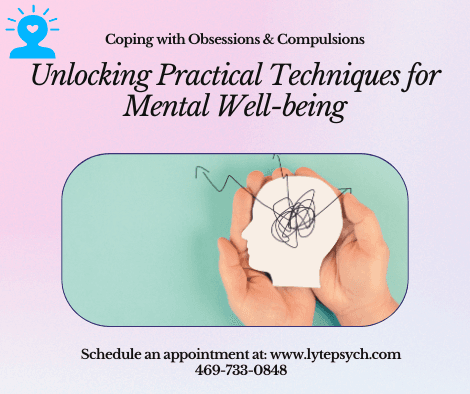Wed May 15 2024
6- Practical Tips & Techniques from Lyte Psychiatry to Cope with Obsession & Compulsions (Best Adults and Adolescents Psychiatrist and Therapist Near You), Affordable Therapists and Psychiatrist, Dallas, Fort Worth, TX

Introduction to Obsessions & Compulsions at Lyte Psychiatry (Best Adults and Adolescen Therapist and Psychiatrist Near You)
Obsessions are intrusive and unwanted thoughts, images, or urges that trigger intensely distressing feelings. Compulsions are behaviors an individual engages in to attempt to get rid of the obsessions and/or decrease their distress. This article explores practical tips and techniques provided by Lyte Psychiatry to cope with these intense impulses effectively.
Here are some practical tips and techniques from Lyte Psychiatry to help cope with obsessions and compulsions:
1. Understand the Triggers
Identify Triggers: Recognize the situations, thoughts, or feelings that trigger obsessive thoughts or compulsive behaviors. Keeping a journal can help track these triggers.
Education: Learn about the nature of obsessive-compulsive disorder (OCD) to better understand why certain thoughts and behaviors arise.
2. Develop Coping Strategies
Mindfulness Techniques: Practice mindfulness to stay present and reduce the power of obsessive thoughts. Techniques like deep breathing, meditation, and body scans can be particularly helpful.
Scheduled Worry Time: Allocate a specific time in the day dedicated solely to worrying. Limit obsessing to this time only, which can help contain the compulsions throughout the rest of the day.
3. Exposure and Response Prevention (ERP)
Professional Guidance: Lyte Psychiatry offers specialized therapy sessions focused on ERP, helping individuals confront their fears without succumbing to rituals.
4. Lifestyle Adjustments
Regular Exercise: Engage in physical activities that can reduce stress and improve overall mental health.
Balanced Diet: Eating a balanced diet can also impact your mental health positively, providing the nutrients necessary for brain health.
5. Professional Help
6. Practice Relaxation Techniques
Yoga and Meditation: Regular practice can help reduce stress and increase resilience against obsessive thoughts.
Progressive Muscle Relaxation: This technique involves tensing and then relaxing different muscle groups, which can be particularly useful in managing physical anxiety symptoms associated with OCD.
Seeking Professional Help and Diagnosis at Lyte Psychiatry (Affordable Therapist and Psychiatrist Near You)
By incorporating these techniques and seeking support from professionals at Lyte Psychiatry, individuals can significantly improve their ability to manage obsessions and compulsions. If you're struggling, don't hesitate to reach out to a professional who can guide you through these strategies tailored to your needs.
To Schedule an appointment. Click Here
To see our services. Click Here
Call us if you have questions at 469-733-0848
FAQs
Q: What are some common triggers of OCD?
A: Common triggers include stress, specific thoughts, or environmental factors like clutter.
Q: How does ERP help in treating OCD?
A: ERP helps by exposing patients to their fears in a controlled environment, which decreases their anxiety over time without performing compulsions.
Q: What lifestyle changes can support someone with OCD?
A: Engaging in regular physical activity, maintaining a healthy diet, ensuring adequate sleep, and reducing stimulants can support mental health.
Q: Is it necessary to see a professional for OCD?
A: Yes, seeing a professional is crucial as they provide specialized treatments like CBT and ERP which are highly effective in managing OCD symptoms.